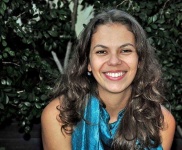

Marina Santana
marina.santana@jcu.edu.au
Recipient of an AIMS@JCU Scholarship
PhD
College of Science and Engineering

Marina Santana
marina.santana@jcu.edu.au
PhD
College of Science and Engineering
Impacts of microplastics on tropical marine organisms and ecosystems
Marina has both the Bachelor (2012) and Msc (2015) in Oceanography at the Oceanographic Institute of the University of São Paulo (IOUSP, Brazil). Since 2010, Marina’s research field has been human impacts on marine ecosystems with emphasis on the biological effects of microplastic marine pollution.
Impacts of microplastics on tropical marine organisms and ecosystems
2017 to 2021
Project Description
Marina’s research project will assess potential impacts of microplastics on reef organisms and ecosystems of the GBR. For that, she will characterize the environmental contamination and bioavailability of microplastics at reefs of Lizard Island (trough field sampling); and, based on these findings, look for the biological effects that can impact ecosystem levels trough lab experiments (e.g. growth and reproduction).
Project Importance
Although microplastic marine pollution has become an ubiquitous issue, the contamination of coral reef ecosystems is still poorly documented. Likewise, microplastic ecological risks posed by validated scenario of contamination (i.e. conditions of exposure found in nature) are not well known. Combined, the findings will be used to assess microplastic environmentally relevant ecological risks for the GBR; informing management of this emerging contaminant.
Project Methods
Marina’s research project will combine field surveys and laboratory experiments to improve our understanding on (i) (micro-)plastic presence in coral reef habitats (field), (ii) microplastic uptake by coral reef organisms (field), and (iii) microplastic potential impacts of ecological relevance (lab). At Lizard Island, microplastics will be sampled in the water and sediments of reefs, and different animals will be collected to check for microplastics uptake (the animals are corals, sponges, ascidians, sea cucumber and fish). Field data will be then used as baseline information to create realistic scenarios of exposure for laboratory experiments, by which Marina aims to investigate (i) selection, retention and depuration of ingested microplastics and (ii) reproduction success, growth and development of one or two of the most contaminated species found in field.
Project Results
Marina is still at her first year of PhD so not much has been done, besides working on the literature review, project proposal, and viabilization of the project. So far, in terms of research, she has been developing the methods to separate the microplastics from the target animals that she will be sampling in field but she still needs more tests to finally establish a good method for each group. Nevertheless, by using real animals to test the efficiency of the methods, Marina has already indications of microplastic contamination of Sea Cucumbers from John Brewer Reef (at the GBR).
Keywords
Benthic,
Coral reefs,
Corals,
Echinoderms,
Ecology,
Field based,
Fish,
Manipulative experiments,
Pelagic,
Physiology,
Pollution,
Porifera (sponges),
Qualitative techniques,
Quantitative marine science,
Tunicates (Sea squirts)